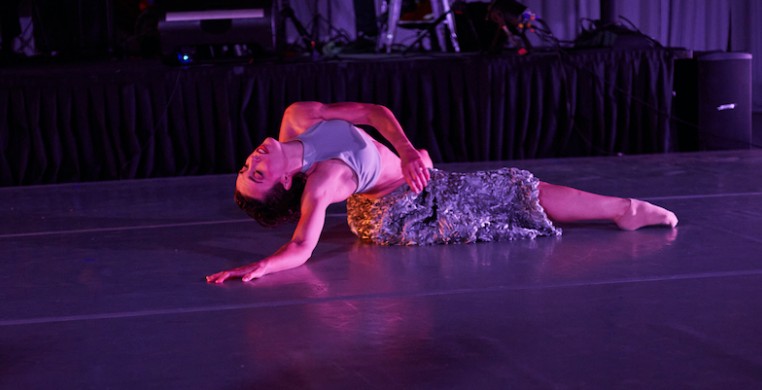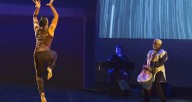When Cerqua Rivera Dance Theatre’s fall concert series, “America/Americans,” hits you, it really hits you. And it sometimes hurts to see your reflection made bare and vulnerable. The narratives that it invokes are dark and painful, but always with a glimmer of hope at the end, embodying the vast milieu of modern American life.
“America/Americans” is dance and music series of works that tell the stories of life’s upheaval due to COVID and the turbulent progression of social justice in the modern-day civil rights movement. The program is curated by and includes works from artistic director and CRDT co-founder Wilfredo Rivera, whose artistic eye has spied a capable lineup of formidable dancers and choreographers of notable Chicago pedigrees: Hubbard Street Dance Chicago, River North Dance Chicago, The Cambrians and Thodos Dance Chicago. Original compositions are provided by co-founder Joe Cerqua, who also directs and performs in a series of short musical interludes featuring the CRDT jazz band. The program is accompanied by gloomy-but-gorgeous graphic projections by Simean Carpenter, original costuming by Jordan Ross and expressive lighting by veteran designer Margret Nelson, all housed in Evanston’s spacious Studio 5 theater.
The program begins with excerpts from “ROOT: mwanzo wa mwili ni roho” by Monique Haley, a West African-inspired piece that kicks off with a solo conversation between dancer and djembe. Soloist Morgan Reed McDaniel is strikingly macabre when her body, bent over backwards and spine parallel to the floor, bobs and weaves as if a corpse reanimated, while her upside-down, floating, disembodied head remains eerily stoic and stationary. Set against a projection of rolling clouds, so too do the dancers roll in, and familiar African-shapes take form—low, sunken postures, the palms of hands pushing against the air and flexed feet exposing naked soles to the audience as they scrape and stomp across the floor.
Next is “Mood Swing,” a response to the COVID pandemic and the social justice uprisings of the last 18 months told through seven original works by five different choreographers. The standout piece, for me, is “Culture Loop,” another work by Haley, which serves as the physical embodiment of what author W.E.B. DuBois called “the sorrow songs,” work songs produced by the enslaved Africans first heard in the 17th century in the U.S. and what served as the precursors to jazz music. Margret Murphy-Webb’s woeful legato vocals follow McDaniel, who is earth-bound and struggling along an imaginary circular path, like a person lost and drowning on land. Another work of note is “Carbon & Gold,” by Eddy Ocampo, which focuses on the prejudice experienced by Asian-American citizens. Soloist Cindy Johnson sheds a draped fabric of “false skin” and continuously reaches out, stalls hesitantly and recoils back, showing signs of fear and introversion.
Act two opens with part of “Identity City,” a work-in-progress by Shannon Alvis. Subtitled "Metamorphosis," the work is inspired by non-binary/gender queer and trans Chicago dance artists. Bright lights sparkle off of silver cheesecloth cloaks which do little to obscure the underlying bodies—made genderless by skin-matching undergarments—as they slowly unfurl their concave spines, reach through their arms and up to the sky, producing an effect like dew-covered chrysanthemums blooming over time-lapse video. The group wilts down to two solitary figures trapped in large bubbles of light—searching for something elusive but never finding it— and then to one, whose sultry hip grinding melts into a monk-like meditation. The work culminates with three couples in priestly red and black robes moving and lifting each other in and out of several formations, a temperate end to a slow burn.
“Shiver” by Stephanie Martinez, is a revival featuring three dancers who represent a singular person, each one embodying a different aspect of that person as they appear before, during and after a great loss. The trio follows a Phillip Glass-like melodic cycle, weaving in and out of each other, always magnifying and contrasting one body against the other two.
The program concludes with another work by Haley, titled “Soul Remedy,” and is a love letter to Black American vernacular dance. Dressed in primary-colored, oversized and pleated pants with thick suspenders to match, a crew of eight dancers present a kitschy homage to 20th-century jazz dance set against projected textual aphorisms—“Jazz is one of the inherent expressions of Negro life in America," for example—and soundless moving images of historic jazz dancers like The Nicholas Brothers and Whitey’s Lindy Hoppers. In a few rare moments, the on-stage dancers’ suave hand gestures and smooth lateral glides catch the same beat as those dancers on display behind them, creating an in-and-out of synchronicity effect, but the projected scenes also have an upstaging effect, with two of the most famous examples of 1940s "flash" dance at times contrasting sharply with Haley’s more reserved and contemporary style. While there is nothing innovative about “Soul Remedy," it is a fun excursion through multiple eras in the history of jazz dance.
Honestly, if I had time-traveled from the past and didn’t know that “America/Americans” was made amid a pandemic, I would not have noticed, except for a brief prelude in “Mood Swing” where dancer-pedestrians wear masks while social distancing from each other—ironic that past-me would have found that a more bizarre choice than today-me. Prejudice, racism, sexist oppression… According to “America/Americans,” not much has seemed to have changed since pre-COVID America. I’m not sure that is the message CRDT was hoping to get across, but it is nonetheless a powerful one.
--
“America/Americans” will run again on Oct. 9 at the Fine & Performing Arts Center at Moraine Valley Community College, 9000 W. College Parkway, Palos Hills. Tickets are $35. Moraine Valley is following COVID-19 safety protocols for visitors on campus. An encore performance of “America/Americans” will be performed on Oct. 17 at Epiphany Performing Arts Center, 201 S. Ashland Ave. Tickets are $100-$175. COVID public health guidelines will be strictly adhered to. Find tickets by viewing the event page below.


